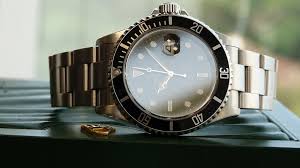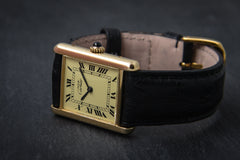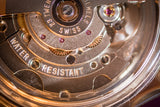Your Cart is Empty


There are few status symbols more powerful than a luxury watch. A high-end timepiece adds instant sophistication to any look, but buying your first luxury watch can feel like a plunge into an abyss. Naturally, quality comes at a price, so making a smart choice could save you more than just the embarrassment of a fashion faux pas. In this beginner’s guide to luxury watches, we’ll walk you through the key points to consider before you part with your hard-earned cash.
Brand is often the first thing we think of when buying a luxury watch. A handful of high-quality manufacturers have come to dominate this niche market, and some have become household names in the process.
Rolex
Rolex is undoubtedly the most famous watchmaker in the world. For many people, owning a Rolex is a lifelong dream, but the Geneva-based brand carefully caps production numbers to ensure their watches remain genuinely exclusive items. Partly as a result of this, Rolex watches often hold their value better than rival brands.
Breitling
Breitling is another top-tier Swiss watch manufacturer. As the wings in the Breitling logo suggest, this brand is associated with aviation. Many Breitling watches are a visual feast, with their large dials and impressive ‘complications’ (extra functions beyond timekeeping).

Cartier
Cartier – the Paris-based watchmaker and jeweler – has a history stretching back to the mid-nineteenth century. Cartier produces watches in a diverse range of shapes; their styles are much more varied than Rolex, and many of the other luxury watch brands. Cartier has also embraced quartz technology more keenly than most rivals.
Dig a Little Deeper
When you first step into the world of luxury watches, it can be hard to look beyond Rolex – but it’s well worth making the effort. We’ve only scratched the surface here, but as well as the brands looked at above, our online luxury watch store features watches by Hublot, Patek Philippe, Frank Muller, Audemars Piguet, and Panerai.
First-time watch buyers often ask which are best, quartz or mechanical watches.
The Science
High-quality quartz watches are exceptionally accurate. A quartz crystal is fed with a tiny current (from the watch’s battery); this causes the crystal to vibrate (or oscillate) at an incredibly precise frequency. This vibration triggers a digital counter to create one pulse per second, which powers the watch.
Mechanical watches are powered by a traditional clockwork mechanism. When the watch is wound, energy is stored in a spring. The spring releases this energy slowly, through gears which connect with a balance wheel. Just like a quartz crystal, this wheel oscillates at a regular rate. Every oscillation triggers the escapement to move the watch’s hands forward.
Quartz watches are slightly more accurate, but many discerning buyers think of quartz technology as sterile. Creating a highly accurate mechanical watch is the supreme test of craftsmanship; this specialized, labor-intensive process results in a mini miracle of engineering that you can wear wherever you go!

Manual vs Automatic Watches
Manual watches require winding by hand to add tension to the mainspring; automatic watches are fitted with a weighted rotor. As you move, so does the rotor – spinning to add tension to the mainspring automatically. Of the two, automatic watches are sometimes favored for convenience, while some manual watches are slightly lighter and more slimline.
Tip: You may see manual watches described as ‘hand-wound watches’ or ‘manual-wind watches’, while automatic watches are also known as ‘self-winding watches’.
Choosing your first luxury watch is just the start. There are some important steps you can take to ensure your new high-end timepiece keeps operating just like, err, clockwork.
Watch-Care Guidelines
Luxury watches sometimes benefit from a little TLC. Our watch-care guide provides advice on how to look after your watch, covering day-to-day basics like how to clean your watch and protect it from threats like magnets, salt water, and detergents.
But there are some things you definitely shouldn’t do yourself. Repairing or servicing a watch requires an expert touch – especially in the case of high-end mechanical watches. It’s best to get your watch checked by a professional if it fails to keep time correctly, if it suffers any kind of damage, or every few years regardless. OMI Jewelry’s watch technicians have the expertise to keep your watch in tip-top shape.
Insuring Your Luxury Watch
Should you insure your luxury watch? We can’t answer that question. It really depends how much you’ve spent vs how much you could afford to lose. Certainly, if you’ve bought a luxury watch as an investment, with the idea that you may sell it later, then you’ll probably want to take out an insurance policy.
Ultimately, luxury watches are made to be worn, admired, and enjoyed, so if insuring your watch gives you the confidence to do that, then it’s well worth the cost.
Comments will be approved before showing up.